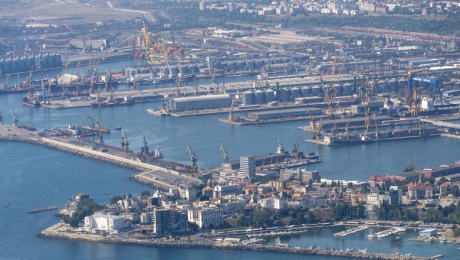The Port of Constanta must become an industrial hub, with a strong petrochemical component, and the investment value could exceed 1.5 billion euro, Prime Minister’s Chancellery’s state advisor Florin Spataru told a specialist event on Monday, informs Agerpres.
“Recently, I have spoken with many producers from the chemical industry, whether companies from the oil and gas sector, which also have a petrochemical division, or petrochemical companies. I want to draw attention to a very important project that we will need to develop: the capacity of the Port of Constanta to become an industrial hub, with a strong petrochemical component. Why? Because it could be the gateway into or out of such a segment. I know, it costs a lot, that’s true. We estimate that such an investment will exceed 1.5 to 2 billion euro, but I don’t think we should focus on the financial component. We are rather talking about the country’s strategy to ensure its economic independence through this value chain generator,” mentioned Florin Spataru during the “Natural Gas Forum – The Contribution of Natural Gas to Industrial Competitiveness in the Context of the Energy Transition,” organised by Financial Intelligence.
At the same time, he emphasised that major players in the market view Romania as an industrial hub in the chemical industry.
“There are important players in the market, not necessarily from the European Union, who see Romania as an industrial hub in the chemical industry. In May of this year, we at the Prime Minister’s Chancellery asked the European Association of Chemical Producers to come to Romania and sign a memorandum for the chemical industry. Why? Because if we look at the trade balance deficit, the chemical industry is in the top three, and it is the catalyst or the generator of the value chain. We’ve closed production capacities in the chemical industry, and we can’t find an acceptable formula that, within the European context, would allow us to produce and remain competitive. Moreover, any lack of response on this matter will increasingly diminish our competitive capacity,” added Spataru.
He pointed out that a project has been initiated at the Chancellery, called the Green Deal Industrial Plan, which is being developed in collaboration with the World Bank.
“This green plan is being created in collaboration with the World Bank. On Thursday, we will have the first deliverable that the World Bank will make available, and we will discuss it with the business environment. This is because we want to integrate an energy strategy that takes into account the resources we have – and gas is an extremely important resource, with a green industrial component – and from there, we will identify the opportunities and the measures that need to be taken. More than that, we will also establish the plans for supporting such a transition. Why? Because I don’t want us to believe that such a transition happens on its own, solely through support from the business environment. No, it is impossible, and this is where the role of the state is crucial. But for that, we need a practical document that is developed with market players and in consultation with the World Bank – a document that will give the Government of Romania, regardless of its composition, a long-term roadmap. The decarbonisation goal by 2050 is not a goal to be achieved within electoral cycles. It is a long-term journey, and any deviation from such a major national project will either waste money or delay the European integration of Romania’s industry, which might no longer be achieved,” explained the state advisor with the Prime Minister’s Chancellery.

